
Struggling
Envious Casca was the murder mystery that Georgette Heyer should have delivered to her publisher, Hodder & Stoughton, early in 1940. However, the outbreak of War had interrupted this plan and she had decided to write The Corinthian instead. That “bubble” of a novel had been a quick and easy project and exactly the escape she had needed from the news of Ronald’s brother’s death in Belgium and other harsh realities of war. But now the book was finished and heading to the printers. Faced with having to write the modern book she had promised Hodder & Stoughton, Georgette was struggling again. In late July 1940 she wrote to her agent to tell him that ‘I am now turning back to Christmas Party. I hope I can cope with it.’ It was a reasonable concern for the War had escalated considerably since May. The Battle of Britain had begun on 10 July and Ronald had applied for War service, while Georgette’s brothers were both in uniform. Georgette herself was fire-watching, caring for Richard (now eight) and trying to write. She was supportive of Ronald’s efforts to make an official contribution to the War Effort and they had sought Frere’s help in pulling strings on Ronald’s behalf at the Admiralty. unfortunately, much to Ronald’s immense disappointment, the Admiralty turned him down for the same reason he had been compelled to leave Dartmouth when he was a teenager – his defective eyesight. Determined to do something for the War effort, Ronald joined the Home Guard. When the Blitz began on 7 September and the German bombers began unloading their lethal weapons over London and the surrounding counties, Georgette found that her writing took a back seat to her concerns for both Ronald and Richard:
‘I can’t say I’m working much at the moment: rather Tired. Too many stray bombs falling within a mile of us, & although I shouldn’t worry for myself, I have to be on the qui viva [alert] at night, because of Richard, peacefully sleeping in his bed. We are situated on a positive rat-run here. They come over every night. That doesn’t matter: it’s when they come back that they unload their bombs, & shake us to our foundations. Also R. on Home Guard duty.
Georgette Heyer to L.P. Moore, letter, 13 September 1940
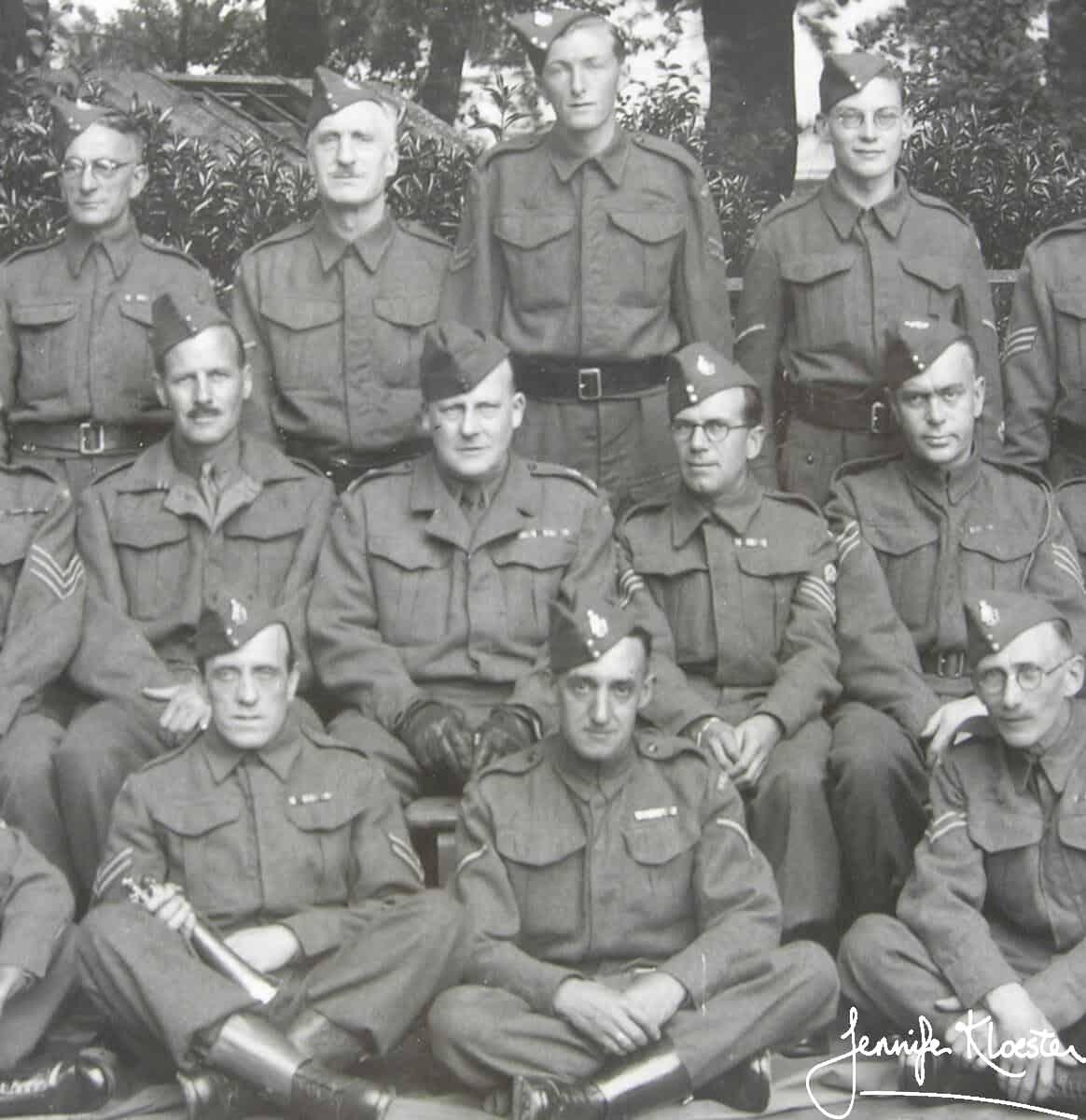
Distracted from Christmas Party again
By mid-October Georgette had managed to start writing again and told Moore that, “I have taken up Christmas Party again, but, like Rose in Mrs Thirkell’s new book, I find Prospects too Dispiriting to take much interest in it.” The realities of War were very distracting. Since qualifying as a barrister, Ronald had found a place in chambers with an office in the famous old Paper Buildings in the Inner Temple. Early on in the bombing, the Blitz had seen all of the glass smashed out of his office windows, but in late October an aerial torpedo in Middle Temple Lane caused still more damage and “split one of the heavy doors from helm to china.” It must have been extraordinarily challenging and taken considerable courage to continue working in such conditions and circumstances.
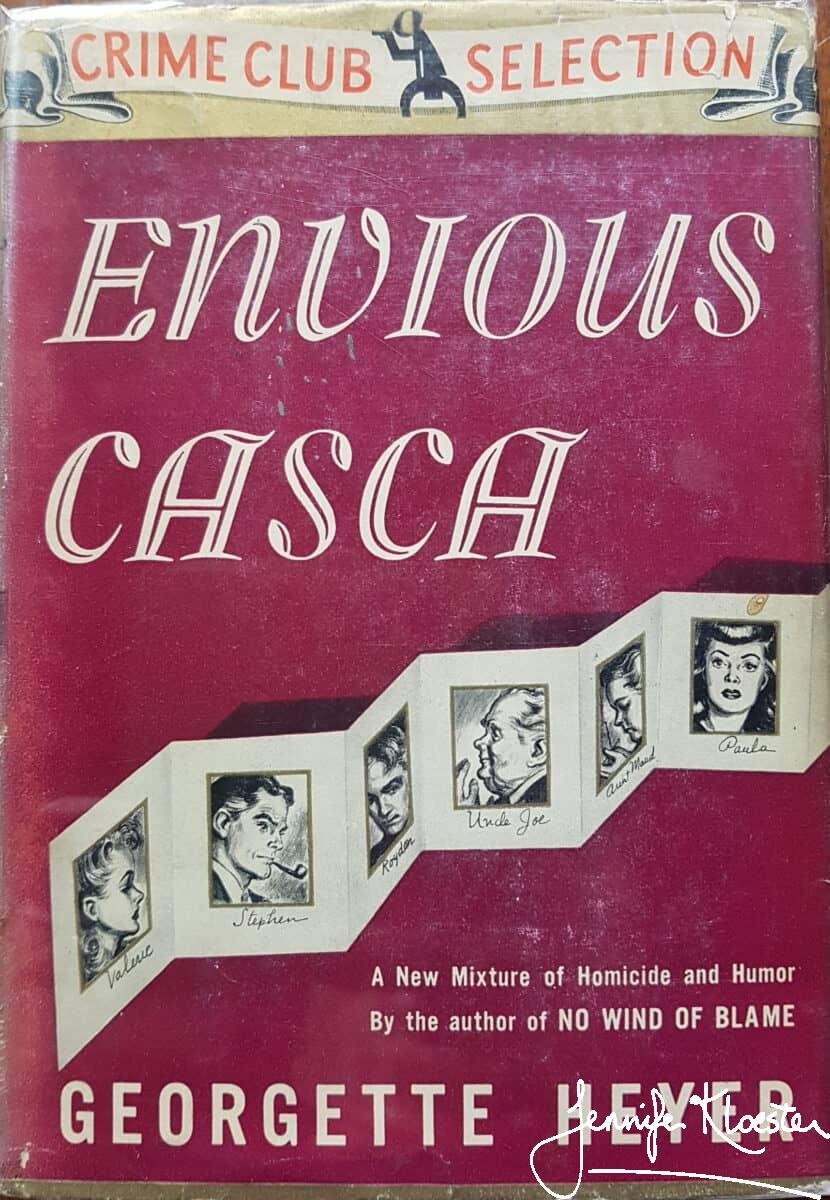
Richard
Meanwhile, her brother Frank had volunteered for the artillery and was now “Gunner F.D. Heyer” while Georgette’s brother Boris was back in England for further army training. Distractions were legion and the bombing raids must have taken their toll. It is remarkable that Georgette managed to write at all. She was especially concerned about Richard, who would be nine the following February and who was, as his mother described him (in typical British fashion of the time): “more repulsive than you would believe possible, & talks of nothing but aeroplanes & violent death.” It must have been terrifying being bombed and Georgette and Ronald soon decided that Richard would be better off in a safer environment than the one in which they were living; he would begin at The Elms prep school in Worcestershire in January. Richard did not want to go away to school for he loved his home in Sussex and the freedom he enjoyed there. The more rural environs around his home allowed Richard exactly the sort of adventures guaranteed to appeal to an energetic and imaginative boy his age – especially during wartime. As Georgette explained to Moore, Richard was
Very angry with me for refusing to let him rush to the scene of an exploded Heinkel. As the relic reported included “bits of Germans all over the place”, you will see that the expedition would have been a rare intellectual treat. When not writing poetry, drama, or short stories, bullying the dog, or falling off his bicycle, he fights all the evacuated boys in our vicinity, with the pleasing object of placing himself in command of them, & scarifying the countryside. As he has considerable boxing skill, & packs a pretty punch, he generally succeeds. He collects scraps of defeated German ‘planes, in defiance of all regulations, these relics being handed over to him by members of Ronald’s patrol, but when asked what he meant to be when grown up depressed & astonished every one by replying with aplomb, “A Commercial Traveller.” He has now skimmed through a few of my books, not in the expectation of enjoyment, but because he says he feels a fool not to have read any. We are sending him to school near Malvern in January.
Georgette Heyer to L.P. Moore, letter, 22 October 1940.

In December 1940 Georgette and Ronald moved to Steyning Mansions, Kings Cliff, Brighton.
Imperial End
With the decision made to send Richard off to boarding school, Georgette and Ronald made another major change in their lives. In December 1940 they left Blackthorns, their home for the past seven years, and moved into temporary accommodation at Heathfield in Horsham. They remained at this boarding house for a week and then, on 19 December, moved into a flat at Steyning Mansions, Kings Cliff, Brighton. Their new flat was cheap and convenient with meals provided which meant Georgette did not have to cook. The location was pleasant with the benefit of sea air although they could not go to the beach across the road as it had been mined and covered with barbed wire. Even the famous Brighton Pier had been partly demolished so that it could not be used as a German landing stage should the enemy attempt an invasion. With some of her domestic cares lifted from her shoulders, Georgette finally began writing in earnest. Her original working title for the novel was Death Before Dinner, but by February it had become Imperial End. Georgette had some concern that this new title might give away the mystery of how Nathaniel Herriard had been murdered and some days later wrote to her agent to say
“The more I think on’t, the more I feel that Imperial End (though nice) may give the show away. How does Uncle Percy like “inherit the Wind”? (Prov. 11.29: He that troubleth his own house…) Other suggestions in order of merit are “Without Enchantment” (not particularly apposite) & “Without Remedy” (Prov. 6.12 & passim). mind you, I like Without Enchantment. Comes from Ecclesiastes 10, 11: “Surely the serpent will live without enchantment.” No preference between this and Inherit the Wind, but must quote the verse for the Ecclesiastes one. Inherit the Wind can stand on its own.
Georgette Heyer to L.P. Moore, letter, 24 February 1941.
It is interesting to note Heyer’s obvious familiarity with The Bible and also her prescience in liking Inherit the WInd as a title. It would be another fourteen years before the famous play (1955) of that name would make its mark on American (and Western) culture and another five years after that when it would win acclaim as an award-winning film (1960). But only a week after writing to Moore about possible titles for her new book, Georgette wrote again to say triumphantly: “hold everything! Get hold of Uncle Percy, & tell him “Envious Casca“. Isn’t that a wow?
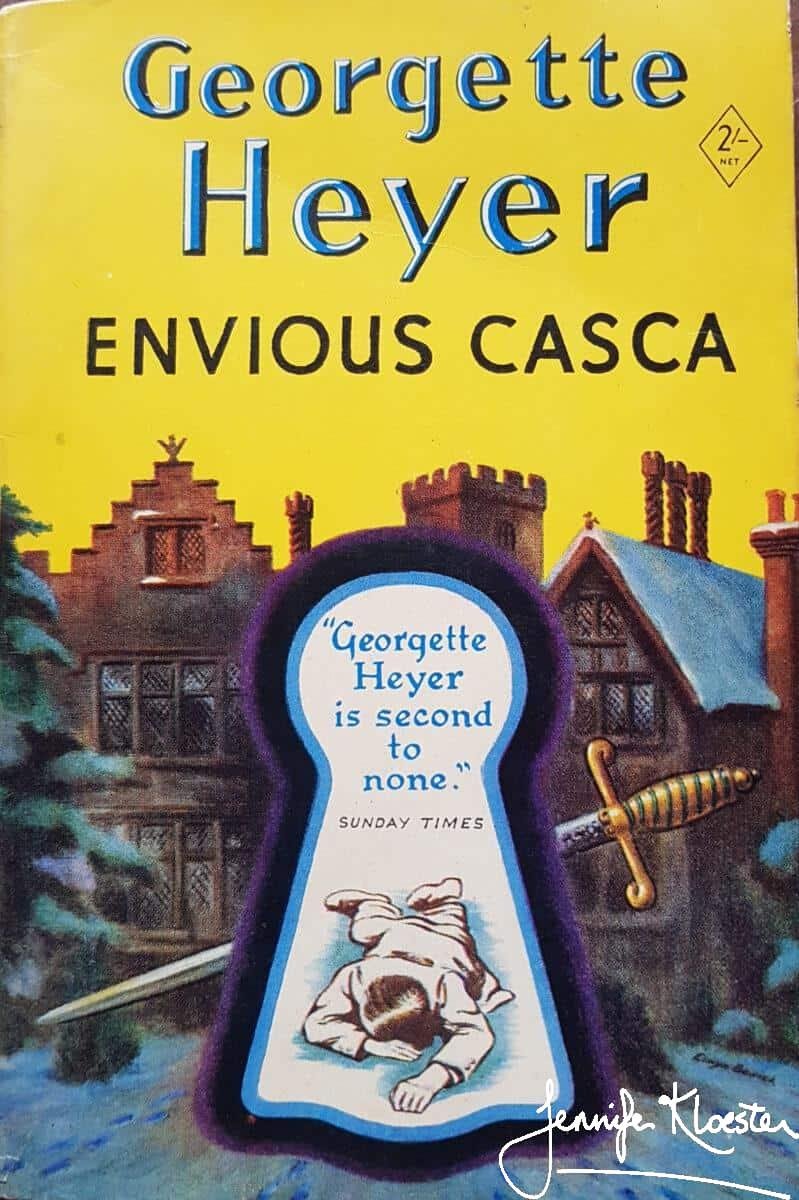
The 1952 Hodder & Stoughton paperback edition. 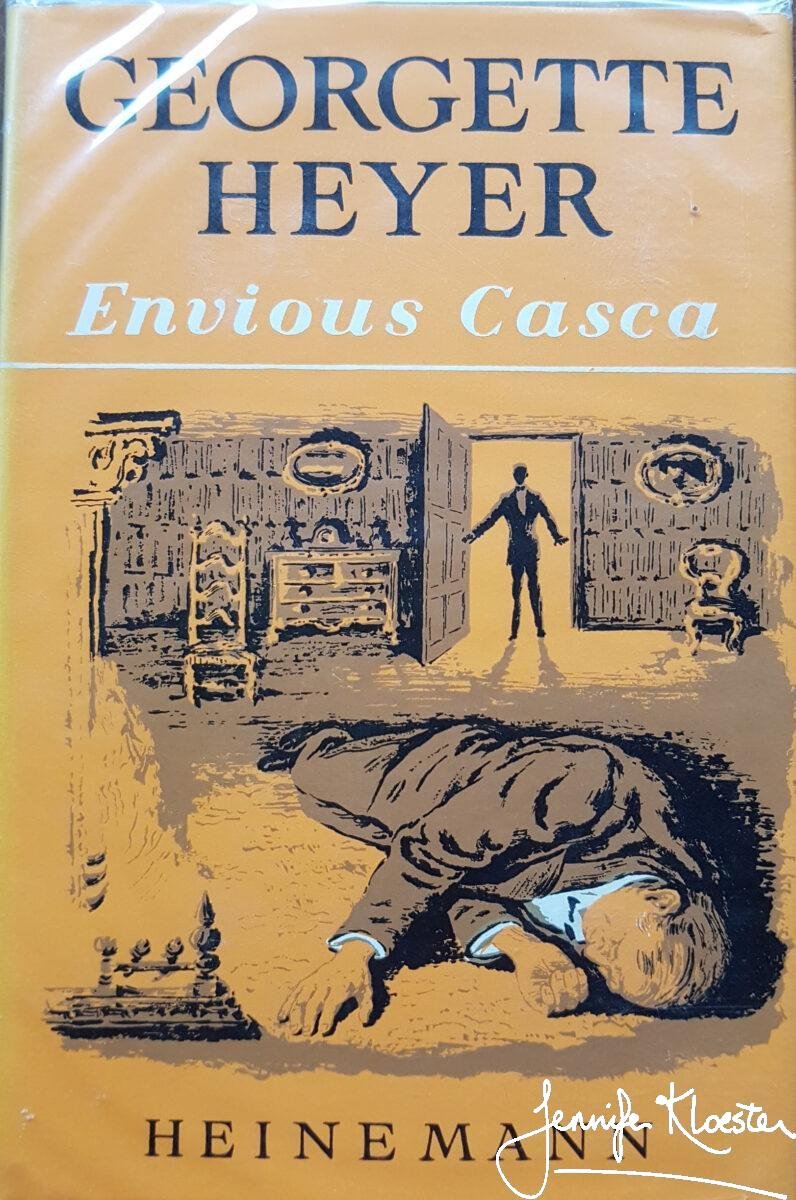
The 1966 Heinemann uniform numbered edition #7.
“A ruder, more objectionable lot of characters”
By March, Georgette was finally making rapid progress with her murder mystery and had even decided that it was “not at all too bad”. She was particlarly pleased with her dramatis personae and proudly told her agent that “I doubt whether I have ever created a ruder, more objectionable lot of characters.” There is no doubt that her cast makes for some very funny moments and many readers will recognise among some of the most irritating types of people. Georgette took particular pleasure in having her intense young playwright read his play aloud to the assembled company – much to their chagrin. This was the sort of behaviour that Heyer always found appalling. She had no patience for authors who “puffed off their consequence” or who thought their work so good that they actually insisted on reading it aloud to some hapless and long-suffering person. Perhaps she drew inspiration from the knowledge that the well-known author Francis Brett Young, had recently read his latest manuscript aloud to Charles Evans, Frere’s co-director at Heinemann. Certainly the report of it greatly amused her. Envious Casca is a “locked-door” murder mystery with a clever solution that may be worked out by the observant reader. In a letter to Moore, Heyer offers one of her rare insights into her writing process, with some very sound advice to aspiring authors at the end:
I am now going to murder Nathaniel. Ronald says it is de mode to murder the victim on the first page. He doesn’t get murdered till chapter IV – 20,000 words, à peu près [about that]. I daresay that doesn’t sound much to you, but let me tell you that the first 20,000 words are harder to write than all the rest. You have to drop your clues in them, & tidy the soil over them; & you have to shape all your characters, & indicate what they’re capable of.
Georgette Heyer to L.P. Moore, letter, 21 February 1941.

The 2006 Arrow edition. 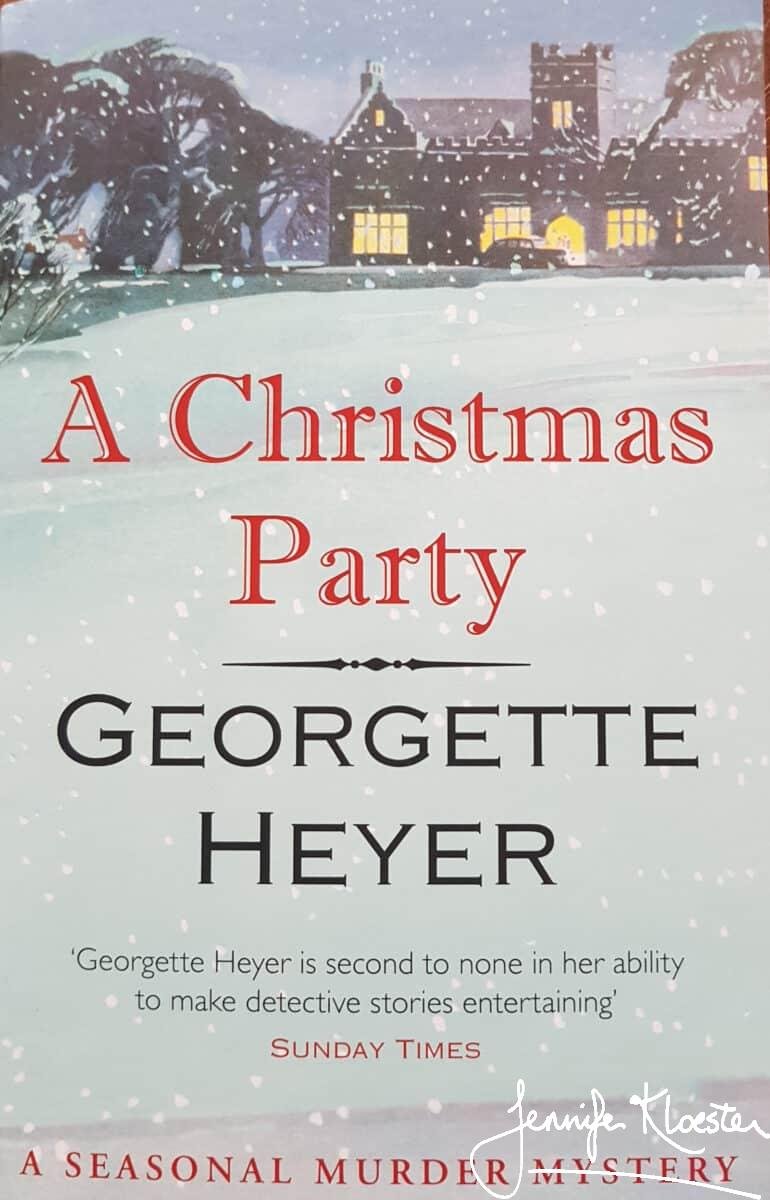
In 2015 Random House brought out the Arrow edition under Georgette’s original title of Christmas Party.
A clever story
Envious Casca is a clever story and for those who love acerbic, difficult and witty characters, great fun to read. One of the novels of the Golden Age of Detective Fiction, It is very much of its era and genre: a country-house mystery with its servants in their “proper” places, an unquestioned social hierarchy, and a comedic but capable detective in Inspector Hemingway. There is some wonderful dialogue and the characterisation is complex and complete. The mystery is sound and the murder method effective and the murderer difficult to discern. When it was finally published in October 1941, Envious Casca garnered a slew of good reviews on both sides of the Atlantic:
‘Some of the bigger shots are back this month: Rex Stout, Georgette Heyer, Ngaio Marsh, John Dickson Carr… Georgette Heyer most entertaining of the sophisticated mystery-mongers, is back from her amblings in costume romance with Envious Casca as tart and juicy as a new apple. One of those house-party affairs, but peopled with a fine aggregation of pungent characters in a perpetual squabble. Brisk and amusing with no nonsense.’
New Republic, 26 January 1942.
‘After too long an absence from the criminous scene, Georgette Heyer returns with a killer-diller that picks up the season in grand shape. Envious Casca is a major Heyer tome, one of the best of the 1941 output and a must item for every fan in good standing…Don’t go elsewhere for Christmas murder.’
New York Herald Tribune, 7 December 1941.
Pharaoh’s Daughter…
Envious Casca had been a long time in the making, but from a slow trot in 1940, in the spring of 1941, Georgette had ended in a fast gallop. By the time she sent the manuscript to Moore for typing in April, she had already decided what to write next:
Do you recall a short I once wrote, & you or Norah sold to Woman’s Journal for a pittance? Well, it was a poor short, but it has the makings of a novel, & it is going to grow into a lovely romantic bit of froth for Heinemann. Title will remain the same – Pharaoh’s Daughter. Not Moses’ girl-friend, but a lady addicted to gaming.
Georgette Heyer to L.P. Moore, letter, 28 April 1941.





1 thought on “Envious Casca – a Christmas Mystery”
Thanks for the background, and for not giving away too much of the plot (!) — I am just starting to read this for the first time.